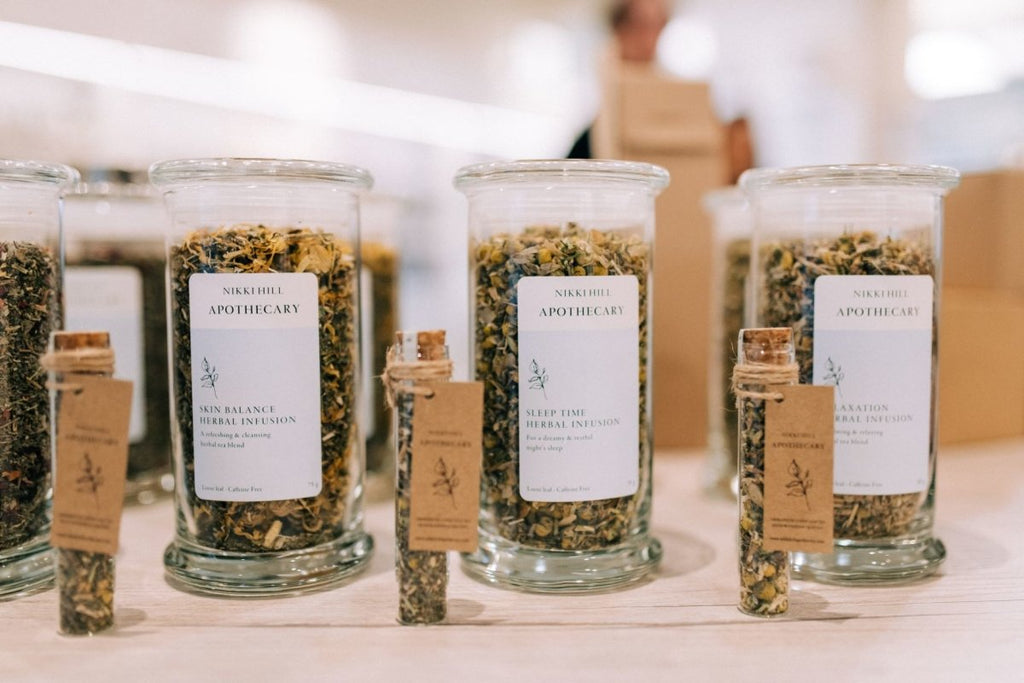Our Five Favourite Teas

It’s national tea day and there is no doubt that tea is something to be celebrated. I love starting my day with a good old English Breakfast and a bit of time to myself to ponder and plan the day ahead. The rest of the day is then dedicated to herbal teas of various types to suit my mood.
There are literally hundreds, maybe thousands of types of tea out there, all with different properties. We have picked our favourite five herbs and blends to tell you more:
- Peppermint and Fennel
Peppermint and fennel are our go to herbs for the digestive system. Both of these herbs help to reduce bloating, flatulence and digestive cramps and are often suggested for people struggling with IBS symptoms.
It appears that peppermint oil may help smooth muscle relaxation, hence it’s effect on cramps. Peppermint oil has been found to positively affect different areas of the digestive system including the oesophagus, stomach, small bowel, gallbladder, and colon.
Nikki Hill Digestive Infusion contains peppermint and fennel along with marshmallow and chamomile to sooth the digestive system.
- Chamomile
A traditional flower to help relax, chamomile is included in many herbal tea blends. Chamomile is said to calm an anxious mind and may help soothe nervous conditions and support healthy sleep patterns.
A favourite of ours is Pukka Night time tea that includes the calming herbs – lavender, oat flower, chamomile and valerian. Our best selling of all our teas, our customers tell us it helps them with a good nights sleep. For a day time moment of Calm, Pukka Camomile, Vanilla, Manuka honey is very popular. - Matcha
Matcha is a powdered type of Japanese green tea. It is deep green in colour and has a strong, quite bitter flavour. Of all teas, Matcha tea is the highest source of antioxidants. Antioxidants protect cells from damage and are known to be protective against cancers, degenerative disease and skin health.
Matcha tea is also high in theanine, an amino acid with stress and anxiety reducing effects. Matcha is however also high in caffeine so we suggest that it is taken in the morning and avoided by people with caffeine sensitivity.
Quality of matcha tea can vary considerably and a pure form is required to gain these properties. We recommend Kiki Health or why not try Planet Paleo Matcha latte for an extra boost of collagen with your Matcha and a smoother taste.
- Liquorice and Cinnamon.
If you struggle with sweet cravings, this is the tea for you.
The sweet taste of liquorice makes it perfect to satisfy the cravings and stop you reaching for the biscuit tin. Cinnamon has been the subject of a lot of research with regards to blood sugar lowering properties. Whilst the amount in herbal teas may not reach the amount used in trials, this tea is a delicious addition to a blood sugar reduction plan.
Pukka Licorice and Cinnamon tea is our go to after dinner tea
- Sage
Sage is a traditional remedy for heat and hot flushes making sage tea a popular choice popular during peri-menopause.
Our favourite is Nikki Hill Meno-Ease tea, a loose tea blend with the highest quality herbs including lemon balm, rose and liquorice alongside sage. These herbs also help to cool and balance and can be enjoyed as a caffeine free treat morning and evening.
Our stores are stocked full of herbal teas by Pukka, Yogi, Salus and Nikki Hill, do pop in and we can show you the range.
References
Antioxidant Properties and Nutritional Composition of Matcha Green Tea (nih.gov)
The Effect of Different Amounts of Cinnamon Consumption on Blood Glucose in Healthy Adult Individuals (nih.gov)
Review article: The physiologic effects and safety of Peppermint Oil and its efficacy in irritable bowel syndrome and other functional disorders (nih.gov)
